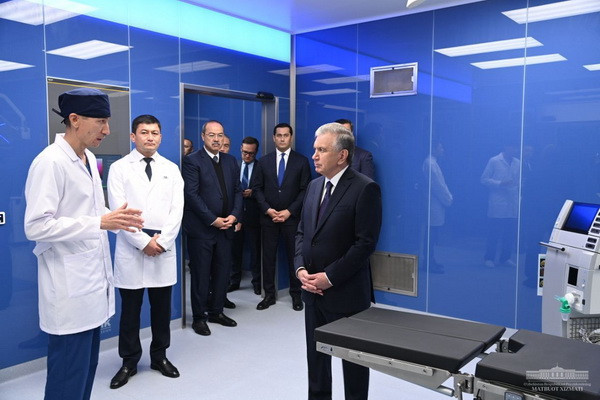
President holds meeting to further reform healthcare system of Uzbekistan
Tashkent, Uzbekistan (UzDaily.com) -- President of Uzbekistan Shavkat Mirziyoyev inspected a new surgical complex built at the Republican Scientific Center for Emergency Medical Care. There are departments of cardiac surgery, transplantation, neurovascular surgery and resuscitation. They are able to provide high-tech medical care to almost 3,000 patients a year.
A videoconference was held here on the work carried out in the healthcare system and priorities for the future.
As you know, on 18 March 2022, the head of state held an open dialogue with medical workers. Today’s meeting has become a logical continuation of this dialogue.
At the beginning of his speech, the President touched upon the work done in the field. In particular, 106 new family medical centers and polyclinics, 1,000 mahalla medical centers have been opened this year. This brings primary health care closer to 3.5 million people.
On the basis of advanced foreign experience, a balance of the population’s need for guaranteed free medical services has been developed. An additional 3,600 nurses and midwives have been allocated to medical teams.
The list of medicines provided free of charge by family doctors has increased from 45 to 70 items. The amount of funds allocated for this increased 3 times compared to last year.
Also, 820 primary medical institutions are provided with diagnostic equipment.
More than 19,000-day hospitals have been organized in family polyclinics. As a result, 740,000 residents got the opportunity to receive treatment in the mahalla itself.
In addition, 70 percent of the population over 40 years of age has been screened for early detection of heart disease and diabetes.
Of the 16 thousand patients in need of high-tech surgical care, 3.2 thousand were treated in the regions and districts.
For the first time in the country, contracts have been concluded with 29 private clinics under the order system.
The salaries of medical personnel have been raised up to 30 percent. Differentiated bonuses and allowances for doctors were also introduced, depending on the performance and results.
In general, 28 trillion soums have been allocated for medicine this year. This is 1.3 times more than last year.
Topical issues in the regions were discussed at the meeting. In particular, it is indicated that there are no medical centers in 272 mahallas.
As part of the Rural Doctor program, the list of remote areas has been expanded to 297.
191 doctors started working on the basis of this program. For example, doctors from Ferghana, Samarkand and Khorezm went to work in Muynak. However, there are still 171 vacancies to be filled in remote villages.
Screening of the at-risk population over 40 is slow in some areas.
Another urgent problem of the primary link is the issue of protection of motherhood and childhood. Until 2010, the annual birth rate in our country was about 600 thousand, and last year this figure exceeded 950 thousand. In this regard, the need to increase the number of beds in maternity wards was emphasized.
On 16 June 2022, the Presidential Decree “On Improving the System of Providing Emergency Medical Assistance to the Population” was adopted. Due to this, it is planned to reduce the time until the arrival of an ambulance by 3 times, and costs - by 25 percent.
This new system is being launched in Andijan, Jizzakh, Samarkand and Surkhandarya. However, construction work has not started in other regions.
It was noted that the work of the republican centers of endocrinology, cardiology and surgery in the regions is unsatisfactory. Therefore, a proposal was put forward to conclude a tripartite agreement between 23 specialized centers, regions and the ministry. At the same time, the centers will take on the tasks of early detection of diseases in the regions, high-tech treatment and prevention, regional khokims - to equip hospitals with high-tech equipment, and the ministry - to stimulate doctors and heads of centers who have shown good results in the regions.
There were also delays in equipping medical institutions with modern equipment.
At the meeting, the information of khokims and officials of the sphere on how to eliminate these shortcomings was heard.
Heads of specialized centers and doctors made proposals to improve the quality of treatment and prevention of diseases.
Based on this, the President set a number of tasks for the responsible persons.
In particular, the Ministry of Health was instructed to develop a three-year program to improve the material and technical base of medical institutions.
Instructions were given to organize medical centers in 300 mahallas this year, and next year to open and equip 140 family medical centers and polyclinics.
It was instructed to take measures to gradually increase the number of beds in maternity hospitals, improve conditions in maternity hospitals, prevent birth defects, and provide mothers with medicines.
It was noted that new high-tech methods of treatment will be introduced in specialized centers, 640 ambulances will be purchased.
The Cabinet of Ministers was instructed to prepare a draft resolution covering the issues of training and advanced training of nurses, encouraging their work, and improving living conditions.